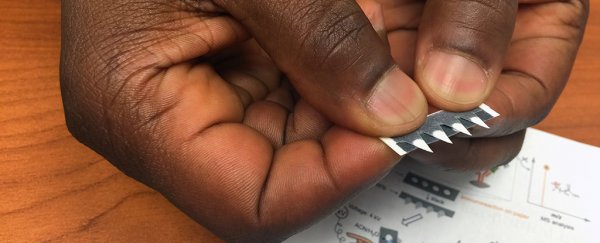Catching diseases early is often crucial to effectively fighting them off, but there are many parts of the world where seeing a doctor or getting access to hospital equipment is a real challenge. That's why cheap home testing kits are so important.
And now a new and potentially life-saving test is being developed by scientists in the US: simple, inexpensive paper strips that could help detect diseases such as cancer and malaria in remote areas.
The idea is they would be almost as easy to use as a simple home pregnancy test - place a small drop of blood on the paper at home, then mail it off to a professional laboratory. If the result comes back positive, an appointment can be arranged; if not, you've got nothing to worry about.
"We want to empower people," said chemist Abraham Badu-Tawiah from Ohio State University, who came up with the idea for the strips. "If you care at all about your health and you have reason to worry about a condition, then you don't want to wait until you get sick to go to the hospital. You could test yourself as often as you want."
The strips were originally conceived as a way of testing for malaria, but Badu-Tawiah says they could work for any disease that the body produces antibodies for – and that includes ovarian cancer and cancer of the large intestine.
Made from sheets of white paper, stuck together with adhesive tape and run through a typical inkjet printer, the strips are covered in wax ink that creates channels and reservoirs to capture the blood sample. Each strip is about the size of a postage stamp.
Small, synthetic 'ionic' probes in the paper, which carry a positive charge, allow for mass spectrometer readings, and keep the blood sample protected against light, temperature, and humidity, until the strip arrives safely at the lab.
The probes have been specially designed to tag specific antibodies carrying signs of disease, and the samples the strips carry are good for at least 30 days. The team is also working to make the tests more sensitive, so saliva or urine could be used in place of blood.
Badu-Tawiah says the strips could help provide invaluable medical care for those in rural or remote communities, including in developed nations, as well as assisting anyone who struggles to attend or pay for regular health check-ups. The strips currently cost around 50 US cents each, but that price should go down further if they're mass-produced.
The researchers have successfully used the strips in testing to detect biomarkers for both ovarian cancer and malaria - a disease that killed around 438,000 people last year. Now they're hoping to license the technology to a medical diagnostics company, with intentions to carry out clinical tests within three years.
It's still early days for these strips, but there's an awful lot of potential here. Let's hope they live up to it and make a whole lot of lives easier.
The findings are reported in the Journal of the American Chemical Society.
